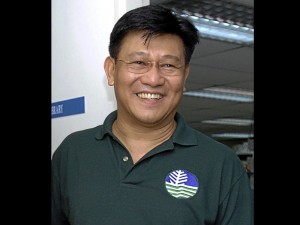Philippines, neighbors come together for benefit of Coral Triangle

Environment Secretary Ramon Paje said the Philippines, the world’s second largest archipelago, should grab the opportunity to lead the region in protecting the Coral Triangle.
Against the backdrop of territorial disputes roiling the region, the Philippines, Malaysia, Indonesia, East Timor and the island states of Papua New Guinea and Solomon Islands on Thursday presented before the Asian Development Bank (ADB) and other institutional donors marine and coastal projects designed to protect the Coral Triangle, a triangular area of the tropical marine waters recognized as the global center of marine biodiversity.
Representatives of the six countries stressed at Thursday’s meeting that the health of the Coral Triangle was vital to their economies. The roughly triangular area, covering 5.7 million hectares of ocean waters, contains 75 percent of the world’s coral species, making it one of the most biodiverse areas in the world.
More than 120 million people live within the Coral Triangle, with 2.2 million directly depending on its biological resources. It also supports a multibillion-dollar tuna industry that props up the economies of the Philippines, Indonesia and the Pacific island states.
Environment Secretary Ramon Paje said the Philippines, the world’s second largest archipelago, should grab the opportunity to lead the region in protecting the Coral Triangle.
“They are looking up to us. The Philippines should now play a major role in regional marine concerns. The entire country is inside the Coral Triangle, unlike Indonesia and Malaysia, where only a portion of their countries are facing it,” he said.
Article continues after this advertisementThe Philippines is proposing to the ADB and donor countries five projects worth $136 million to protect the Coral Triangle and promote sustainable fishing. They include the rehabilitation of mangroves, establishment of a marine database, and implementation of a national coastal and marine management program.
Article continues after this advertisementPaje said the projects would fill the gaps in the country’s targets and goals in guarding the marine environment.
He said the Philippine government was willing to commit $40.8 million to the project, noting that it was a “very practical area of investment for coastal and marine protection.”
As part of the Coral Triangle Initiative, the Philippines and Malaysia also discussed a bilateral agreement yesterday to shore up their resources to effectively protect their common marine boundaries against poachers, said Jacob Meimban, executive director of the DENR-Coastal and Marine Management Office.
The two neighbors also talked about sharing information on marine resources. Officials said there was no accurate record of legal and illegal fishers in the waters in their common boundaries nor was there data on the population of species that traveled across these waters, Meimban said.
The Philippines and Malaysia, together with Brunei, Vietnam China and Taiwan, have overlapping claims over the Spratly archipelago in the West Philippine Sea (South China Sea). Each of the claimants have made forays into the islands and built naval facilities over the years.
Despite the dispute over the Spratlys, the Philippines and Malaysia are united in their concern about the illegal activities in the region, DENR officials said.
Meimban noted that the poaching of endangered marine species like sharks and turtles is a major problem for Malaysia.